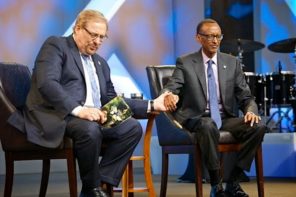Bishop Christopher Senyonjo was among the few people who spoke out against the “Kill the Gays” bill that has been receiving a hearing before the Ugandan Parliament this week. Speaking earlier this year to Uganda’s beleaguered LGBT community, the 79-year-old bishop told them “I know that some [gays and lesbians] are discouraged and even not going to church because they are being abused. Even today they are being abused. But please don’t be discouraged. God created you and God is on your side.”
At the hearing, however, the bishop told one Parliament member: “I am not advocating for the LGBT community. I am just dealing with reality.”
While I find his words troubling, given what he told LGBT Ugandans, I too, must deal with reality. If the bishop appeared before the Parliament members to advocate for the LGBT community, he would not be heard. Instead, he presented the case that the bill—which still currently calls for the death penalty for gays and lesbians—will only worsen the country’s HIV and AIDS problems.
“If we criminalize the LGBT community further, it will drive Ugandans further underground and compromise the relationship of medical, counselors and clergy that is sacrosanct and needs to remain confidential,” the bishop said. “How can we expect doctors to treat everyone when this bill will require them to report on their patients who are LGBT?”
Senyonjo remains brave before the parliamentary committee though, when he disputed a common claim by supporters of the bill who say school children are being recruited by gays and lesbians. “They naturally become so,” he said.
This is the final day of testimony before the parliamentary committee. Senyonjo expects the bill to move forward, though it may be amended to remove the death penalty and instead imprison those convicted of homosexuality to seven years in prison. Those who “aids, abets, counsels or procures another to engage of acts of homosexuality” also face seven years in prison. “Landlords who rent rooms or homes to homosexuals also could get seven years,” noted the Associated Press.
The current session of the Ugandan Parliament ends May 18, and the bill may be voted on before then, though its sponsor, David Bahati, has said he will persist in getting the bill passed in the next session if it fails next week.
If the reality of the damage the bill will do to the AIDS and HIV battle in Uganda is not enough motivation for Parliament to turn down the bill, Uganda must hear more reality from the international community. As the bill draws ever closer to become law, now is the time for renewed international outrage and pressure. Will religious leaders in the U.S. speak out? Will U.S. political leaders speak out or threaten aid to Uganda? Will the evangelicals who fostered support for this bill and animosity for gays and lesbians do anything to stop its passage?
All Out is sponsoring a petition against the bill here.



